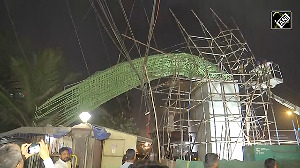Addressing questions over the visit of Prime Minister Narendra Modi to his official residence for Ganpati prayers, Chief Justice of India (CJI) D Y Chandrachud on Monday said there was 'nothing wrong' in it and underscored the need for a 'sense of maturity in political sphere' on such issues.

Following the PM's visit at the CJI residence, opposition parties led by the Congress and a section of lawyers had raised concerns over propriety and separation of powers between the judiciary and the executive.
The Bharatiya Janata Party, on the other hand, dismissed the criticism as unwarranted and said it was a 'part of our culture'.
Speaking at an event organised by the Indian Express, CJI Chandrachud said one has to respect that the dialogue between the judiciary and the executive takes place as a part of the robust inter-institutional mechanism and separation of powers does not mean the two will not meet.
"The separation of powers concept does not postulate that judiciary and executive are antagonist in the sense they will not meet or not engage in a reasoned dialogue. In the states, there is a protocol of chief justice and the administrative committee of the high court meeting the chief minister and on the chief minister meeting the chief justice at their residence. In most of these meetings, you are discussing basic issues like budgeting, infrastructure, technology etc," he said.
On the prime minister's visit, the CJI shared, "The PM visited my residence for Ganpati puja. I do feel, there is absolutely nothing wrong as these are continuing meetings between the judiciary and the executive even at the social level. We meet at the Rashtrapati Bhavan, Republic Day, etc. We are in conversation with the prime minister and the ministers. This conversation does not involve the cases which we decide but life and society in general."
The CJI, who demits office on November 10, said, "There has to be a sense of maturity in the political system to understand this and trust our judges because the work we do is evaluated by our written word. Everything we decide is not kept in wraps and is open to scrutiny."
He said a robust dialogue taking place between the executive and the judiciary on the administrative side had nothing to do with the judicial side.
"What the separation of powers postulates is that the judiciary should not be performing the role of the executive which is defining policies because the power to frame policy belongs to the government. Likewise the executive does not decide the cases. So long we have this in mind. Dialogue has to take place because you are dealing with the careers and the lives of people in the judiciary," he said.
The CJI said the dialogue between the judiciary and the executive had nothing to do with how cases were decided.
"That has been my experience," the CJI said.
Even his statement of having prayed to God for a solution to the Ayodhya Ram Mandir dispute had attracted considerable clamour.
On Monday, CJI Chandrachud called himself a 'person of faith' who respected all religions equally.
"It is a problem of social media. You must have the backdrop of where I was speaking," he said.
His statement had come while addressing the residents of his native Kanhersar Village in Khed Taluka during a felicitation ceremony, when he said he had prayed to God for a solution to the Ram Janmabhoomi-Babri Masjid dispute and asserted God will find a way if one has faith.
"Very often we have cases (to adjudicate) but we don't arrive at a solution. Something similar happened during the Ayodhya (Ram Janmabhoomi-Babri Masjid dispute) which was in front of me for three months. I sat before the deity and told him he needs to find a solution," he had said.











 © 2025
© 2025